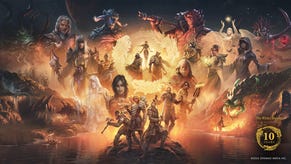Dispelling the myths of breaking into emerging markets
New services firm The 4 Winds Entertainment on simple ways publishers can reach billions of new players
Steven Huot has spent most of his career so far helping Blizzard to conquer the world.
He joined the Warcraft firm in the early days, contributing to its first titles and over the course of more than two decades came to lead the publisher's efforts in emerging markets such as Latin America and what the company referred to as the "emerging West," including Russia, the Middle East and Africa.
During this time, he spent years either living in or travelling around the regions he represented, and soon learned one important truth: "You win the hearts and minds of players there and they'll never forget it."

But, he continues, not all major games firms understand this, recalling times he was trying to convince Blizzard of the opportunities Brazil and its population of 200 million offered.
"They were imagining people who live in mud huts," he says. "I was seeing 30 million people living in São Paulo, all in high rises, all playing games on consoles, PCs and mobile phones, begging this company to get there."
Today, he aims to further demonstrate the potential of emerging markets as CEO of a new company, The 4 Winds Entertainment. Based in Amsterdam, this services firm aims to lend publishers expertise for marketing and launching games in key territories, helping them to reach audiences outside the West.
The core team is just seven people, but The 4 Winds has already gathered a network of freelancers and agencies that bring its workforce up to 30 people, and can scale beyond that if needed.
The 4 Winds is focused on tapping into emerging markets, or -- as Huot prefers to call them -- "opportunity markets."
"China was an emerging market, and if you missed it when it was, it's a little bit too late for you today," he explains. "Emerging market is a misnomer and gives the industry the excuse not to go there. 'Well, it's still emerging -- I'll get there when I need to,' as if there's no rush. But there is a rush. There's other people developing those markets, regional players and so on.
"And some of these emerging markets aren't emerging at all -- they're civilisations that are thousands of years old so calling them emerging markets doesn't make sense. For this industry, they're truly opportunity markets and need to be given more credit."
"Emerging market is a misnomer and gives the industry the excuse not to go there... For this industry, they're truly opportunity markets and need to be given more credit"
To begin with, The 4 Winds is concentrating on three territories: the Middle East, which Huot can be bigger than the UK or Germany in terms of both players and dollars; Turkey, which can be just as big in terms of population although not necessarily revenues; and Russia, which -- while somewhat more established -- "hasn't even been exploited" by some games brands.
The company claims that opportunity markets represent 40% of the global population, or an estimated one billion people. And the combination of every Russian-speaking nation, the Arabic countries of the Middle East and North Africa, and Turkey amounts to 538 million people -- 20% of the global population.
It's an area Huot sees growing demand for, claiming that Western developers and publishers "tend to overlook" these regions or avoid them because of complexities, which he argues are not as arduous as some may think.
"The industry has long since made the mistake of measuring these markets based on what they sold [the previous] year," he explains. "If they didn't sell much, they don't think it's worth it.
"But they forget that they didn't actually launch anything that year, or they just made an English version of the game available. Not in the language those people speak, not with the payment methods they need to use in order to pay online. That's something we take for granted in the West, that everyone has a way to pay online if they want. In certain countries, many countries, there are very specific local payment methods that are the only way people pay. If you don't accept it, if you don't have the local currency, [you won't sell]."
It creates a self-fulfilling prophecy, he says, where companies don't think the market is ready because they don't reap the rewards, but the rewards are limited by how little activity they do there.
He also points to major publishers' track record for consolidating -- as we've recently seen with Activision in Europe -- where closing regional offices can cause companies to "quickly lose local market knowledge."
"As big publishers pull back from the regional markets, they lose the regional expertise that got them there in the first place," Huot says. "They have their reasons, chasing the ideal of the one-size-fits-all global marketing solutions that do work in some markets -- and certainly the developed West -- but it doesn't work outside the West where there are fewer homogenous marketplaces."
"No-one is growing as much as they could in the West without stealing market share. Wouldn't it be nice to get a share of where the real industry growth is happening?"
He adds: "We understand the business justification of companies wanting to close regional offices. They cost money, they cost time, it's something more to manage. But in the long run, we're sure they're going to lose... They immediately lose that local expertise and forget how valuable those skills have been for them in the past, and how necessary they will be for the future."
Publishers targeting regions from afar can also struggle to understand the best way to reach their audience. Huot posits that big budget advertising is "actually highly ineffective" in most emerging markets, whereas strategic spending on influencer marketing or specific local channels yields better results.
When it comes to language, the 4 Winds CEO also warns that success comes down to more than just translation -- something we've explored on the GamesIndustry.biz Academy before. Arabic, for example, is read from right to left, unlike most Western languages.
"If you don't realise that, and all your interface or ads read left to right and you're just translating something... You'll end up writing an ad where the headline is on the left and the subhead is on the right, but of course it's read completely backwards," he says. "It's a simple flip but it's surprising how many people forget that. It's the sort of obvious thing where you just need to speak to someone from a local marketing agency."
And given that Arabic is the fifth most spoken language in the world at 274 million speakers, that's a significant audience publishers won't want to overlook.
There are also different expectations when it comes to delivery of language through the games themselves. Huot reports that, while people in the Arab state of the Persian Gulf are comfortable with subtitles in Western-produced entertainment, some nations such as Turkey and Egypt expect full translations -- especially since English literacy can be low in certain regions.
Even the timing of campaigns needs to be carefully considered. Most of the Arabic nations in the Middle East operate on the Hijri calendar instead of the Gregorian one the West uses. This means their weekdays are different -- Sunday to Thursday -- and holidays fall at different times of the year. That's something to bear in mind with reveals and marketing beats since their media consumption won't be in sync with that of Western audiences.
Finally, Huot believes many publishers are "scared away" by the idea that they need to dramatically modify their game in order to sell into regions like the Middle East -- but that's not actually the case.
"They're watching the same Netflix movies we watch in the Middle East," he says. "There's a good rating system and there's appreciation for the creativity and the art form that it is. The only thing you have to do is the same thing for any market: treat it correctly, like the nation that it is. What you can do are very simple things that have global appeal: regional assets, skins, local in-game events -- when I was at Blizzard, we did events related to Ramadan, for example.
"Putting an asset in creates great regional goodwill and appreciation that you're serious about the market, and those assets can be used globally. It's an event, and it can be around a different culture and exposing people to different aspects of the world. It's a regional effort that has global appeal. When done right, you're not even doing any extra work but that's where people get lost in the belief that they have to do all this special work for the market."
The 4 Winds Entertainment also hopes to help publishers and developers reach India, Egypt and sub-Saharan Africa, adding that -- while it is focusing primarily on AAA games -- there are even larger opportunities in some regions for mobile games.
Ultimately, the company's goal is to show that emerging markets are not as inaccessible as games firms might think, and given how increasingly crowded the established Western markets are, they could provide a much-needed boost to business.
"No-one is growing as much as they could in the West without stealing market share," Huot concludes. "They're slugging it out with each other for the same slice of the pie. That's something they have to do, but wouldn't it be nice to get a share of where the real industry growth is happening?"









